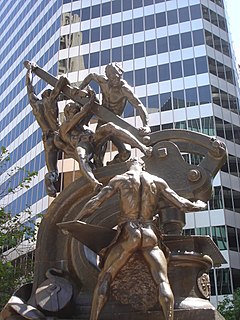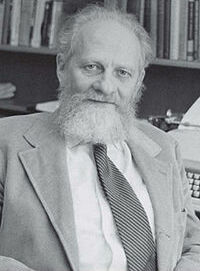
The following outline is provided as an overview of and topical guide to the discipline of sociology:

A social class is a set of concepts in the social sciences and political theory centered on models of social stratification that occur in a class society, in which people are grouped into a set of hierarchical social categories, the most common being the upper, middle and lower classes. Membership in a social class can for example be dependent on education, wealth, occupation, income, and belonging to a particular subculture or social network.

Social class in the United States refers to the idea of grouping Americans by some measure of social status, typically economic. However, it could also refer to social status or location. The idea that American society can be divided into social classes is disputed, and there are many competing class systems.

Urban sociology is the sociological study of life and human interaction in metropolitan areas. It is a normative discipline of sociology seeking to study the structures, environmental processes, changes and problems of an urban area and by doing so provide inputs for urban planning and policy making. In other words, it is the sociological study of cities and their role in the development of society. Like most areas of sociology, urban sociologists use statistical analysis, observation, social theory, interviews, and other methods to study a range of topics, including migration and demographic trends, economics, poverty, race relations and economic trends. Urban sociology is one of the oldest sub-disciplines of sociology dating back to the mid-nineteenth century.

Social mobility is the movement of individuals, families, households, or other categories of people within or between social strata in a society. It is a change in social status relative to one's current social location within a given society. This movement occurs between layers or tiers in an open system of social stratification. Open stratification systems are those in which at least some value is given to achieved status characteristics in a society. The movement can be in a downward or upward direction. Markers for social mobility, such as education and class, are used to predict, discuss, and learn more about an individual or a group's mobility in society.

Peter Michael Blau was an American sociologist and theorist. Born in Vienna, Austria, he immigrated to the United States in 1939. He completed his PhD doctoral thesis with Robert K. Merton at Columbia University in 1952, laying an early theory for the dynamics of bureaucracy. The next year, he was offered a professorship at the University of Chicago, where he taught from 1953 to 1970. He also taught as Pitt Professor at Cambridge University in Great Britain, as a senior fellow at King's College, and as a Distinguished Honorary professor at Tianjin Academy of Social Sciences which he helped to establish. In 1970 he returned to Columbia University, where he was awarded the lifetime position of Professor Emeritus. From 1988 to 2000 he taught as the Robert Broughton Distinguished Research Professor at University of North Carolina, Chapel Hill in the same department as his wife, Judith Blau, while continuing to commute to New York to meet with graduate students and colleagues.
John Harry Goldthorpe is a British sociologist. He is an emeritus Fellow of Nuffield College, Oxford. His main research interests are in the fields of social stratification and mobility, and comparative macro-sociology. He also writes on methodological issues in relation to the integration of empirical, quantitative research and theory with a particular focus on issues of causation.
Sociological Abstraction refers to the varying levels at which theoretical concepts can be understood. It is a tool for objectifying and simplifying sociological concepts. This idea is very similar to the philosophical understanding of abstraction. There are two basic levels of sociological abstraction: sociological concepts and operationalized sociological concepts.
In the field of sociology, cultural capital comprises the social assets of a person that promote social mobility in a stratified society. Cultural capital functions as a social relation within an economy of practices, and includes the accumulated cultural knowledge that confers social status and power; thus cultural capital comprises the material and symbolic goods, without distinction, that society considers rare and worth seeking. There are three types of cultural capital: (i) embodied capital, (ii) objectified capital, and (iii) institutionalised capital.
Class stratification is a form of social stratification in which a society is separated into parties whose members have different access to resources and power. An economic, natural, cultural, religious, interests and ideal rift usually exists between different classes.

A sociological theory is a supposition that intends to consider, analyze, and/or explain objects of social reality from a sociological perspective, drawing connections between individual concepts in order to organize and substantiate sociological knowledge. Hence, such knowledge is composed of complex theoretical frameworks and methodology.
Randall Collins is an American sociologist who has been influential in both his teaching and writing. He has taught in many notable universities around the world and his academic works have been translated into various languages. Collins is currently the Dorothy Swaine Thomas Professor of Sociology, Emeritus at the University of Pennsylvania. He is a leading contemporary social theorist whose areas of expertise include the macro-historical sociology of political and economic change; micro-sociology, including face-to-face interaction; and the sociology of intellectuals and social conflict. Collins's publications include The Sociology of Philosophies: A Global Theory of Intellectual Change (1998), which analyzes the network of philosophers and mathematicians for over two thousand years in both Asian and Western societies. His current research involves macro patterns of violence including contemporary war, as well as solutions to police violence. He is considered to be one of the leading non-Marxist conflict theorists in the United States, and served as the president of the American Sociological Association from 2010 to 2011.

The sociology of education is the study of how public institutions and individual experiences affect education and its outcomes. It is mostly concerned with the public schooling systems of modern industrial societies, including the expansion of higher, further, adult, and continuing education.

Cultural reproduction, a concept first developed by French sociologist and cultural theorist Pierre Bourdieu, is the mechanisms by which existing cultural forms, values, practices, and shared understandings are transmitted from generation to generation, thereby sustaining the continuity of cultural experience across time. In other words, reproduction, as it is applied to culture, is the process by which aspects of culture are passed on from person to person or from society to society.
Status attainment is the process of one attaining one's positions in society, or class. Status attainment is affected by both achieved factors, such as educational attainment, and ascribed factors, such as family income. The theory of status attainment states that one can be mobile, either upwardly or downwardly, in the form of a class system.
Racial formation theory is an analytical tool in sociology, developed by Michael Omi and Howard Winant, which is used to look at race as a socially constructed identity, where the content and importance of racial categories are determined by social, economic, and political forces. Unlike other traditional race theories, "In [Omi and Winant's] view, racial meanings pervade US society, extending from the shaping of individual racial identities to the structuring of collective political action on the terrain of the state".

Sociology is a social science that focuses on society, human social behavior, patterns of social relationships, social interaction, and aspects of culture associated with everyday life. It uses various methods of empirical investigation and critical analysis to develop a body of knowledge about social order and social change. While some sociologists conduct research that may be applied directly to social policy and welfare, others focus primarily on refining the theoretical understanding of social processes and phenomenological method. Subject matter can range from micro-level analyses of society to macro-level analyses.
The British Journal of Sociology is a peer-reviewed academic journal that was established in 1950 at the London School of Economics. It represents the mainstream of sociological thinking and research and publishes high quality papers on all aspects of the discipline, by academics from all over the world.

A social network is a social structure made up of a set of social actors, sets of dyadic ties, and other social interactions between actors. The social network perspective provides a set of methods for analyzing the structure of whole social entities as well as a variety of theories explaining the patterns observed in these structures. The study of these structures uses social network analysis to identify local and global patterns, locate influential entities, and examine network dynamics.

Erik Olin Wright was an analytical Marxist sociologist at the University of Wisconsin–Madison, specializing in social stratification and in egalitarian alternative futures to capitalism. He was known for diverging from classical Marxism in his breakdown of the working class into subgroups of diversely held power and therefore varying degrees of class consciousness. Wright introduced novel concepts to adapt to this change of perspective including deep democracy and interstitial revolution.








